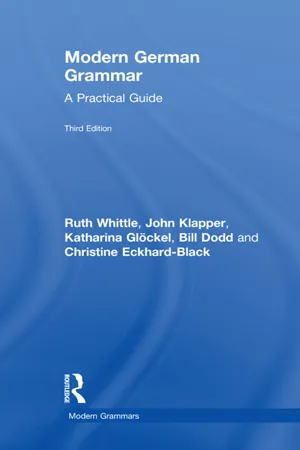
Modern German Grammar
A Practical Guide
- 480 pages
- English
- ePUB (mobile friendly)
- Available on iOS & Android
Modern German Grammar
A Practical Guide
About this book
Modern German Grammar: A Practical Guide, Third Edition is an innovative reference guide to German, combining traditional and function-based grammar in a single volume.
The Grammar is divided into two parts. Part A covers grammatical categories such as word order, nouns, verbs and adjectives. Part B is organised according to language functions and notions such as:
- making introductions
- asking for something to be done
- delivering a speech
- possibility
- satisfaction.
The book addresses learners' practical needs and presents grammar in both a traditional and a communicative setting. New to this edition, and building on feedback from the previous edition:
- The rules of the latest (and so far final) spelling reform have been implemented throughout.
- Examples of usage have been updated and consideration given to Swiss and Austrian variants.
- The chapter on register has been expanded and now includes youth language and frequently used Anglicisms in German.
- The Index now has even more key words; it has also been redesigned to differentiate between German words, grammar terms, and functions, thus making it more user-friendly.
The Grammar assumes no previous grammatical training and is intended for all those who have a basic knowledge of German, from intermediate learners in schools and adult education to undergraduates taking German as a major or minor part of their studies.
The Grammar is accompanied by a third edition of Modern German Grammar Workbook (ISBN 978-0-415-56725-1) which features exercises and activities directly linked to the Grammar.
Ruth Whittle is Lecturer, John Klapper is Professor of Foreign Language Pedagogy, Katharina Glöckel is the Austrian Lektorin and Bill Dodd is Professor of Modern German Studies – all at the University of Birmingham. Christine Eckhard-Black is Tutor and Advisor in German at the Oxford University Language Centre.
Tools to learn more effectively

Saving Books

Keyword Search

Annotating Text

Listen to it instead
Information
X
Social contact
60 Greeting
60.1Using du, ihr and Sie
60.2Initial greeting
Table of contents
- Cover Page
- Half Title page
- Title Page
- Copyright Page
- Contents
- Introduction
- How to use this book
- Glossary
- Part A Structurs
- Part B Functions
- Index of grammatical terms
- Index of functions
- Index of Germany keywords
Frequently asked questions
- Essential is ideal for learners and professionals who enjoy exploring a wide range of subjects. Access the Essential Library with 800,000+ trusted titles and best-sellers across business, personal growth, and the humanities. Includes unlimited reading time and Standard Read Aloud voice.
- Complete: Perfect for advanced learners and researchers needing full, unrestricted access. Unlock 1.4M+ books across hundreds of subjects, including academic and specialized titles. The Complete Plan also includes advanced features like Premium Read Aloud and Research Assistant.
Please note we cannot support devices running on iOS 13 and Android 7 or earlier. Learn more about using the app